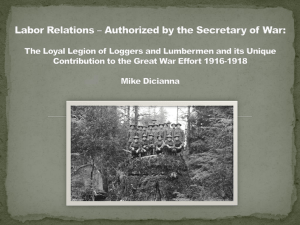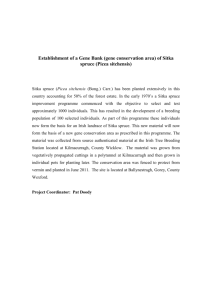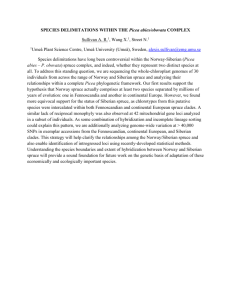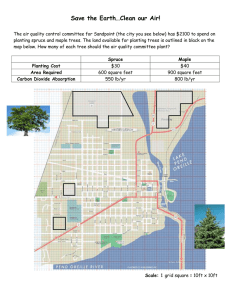Black Hills Spruce
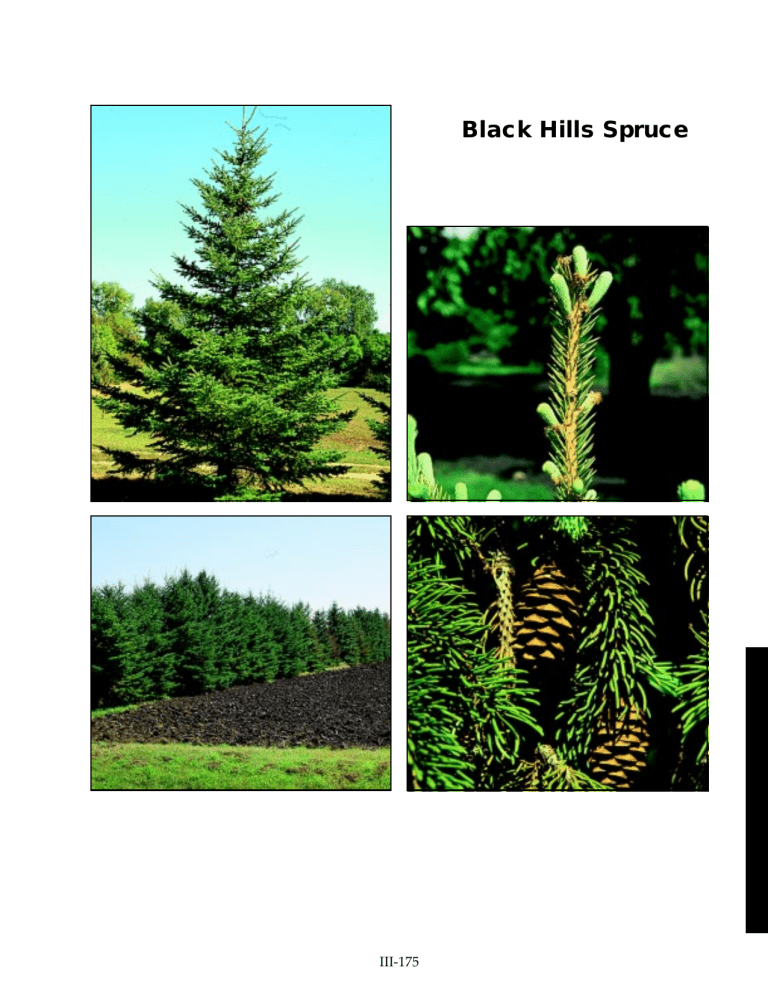
slide 85a
400%
Black Hills Spruce
slide 85b
360% slide 85c
380% slide 85d
360%
III-175
Black Hills Spruce
(Picea glauca var. densata)
General Description
A large tree, very dense and pyramidal when young.
Not as drought tolerant as Colorado Spruce. Black Hills
Spruce is a naturally occurring variety of white spruce native to South Dakota. Better adapted than White Spruce
(Picea glauca) which is native in the eastern United States, as far west as Minnesota. The largest spruce tree in North
Dakota is 95 feet tall with a canopy spread of 42 feet.
Leaves and Buds
Bud Arrangement - Whorls.
Bud Color - Chestnut brown scales, blunt tips, not resinous.
Bud Size - Buds are about 1/4 inch long.
Leaf Type and Shape - Needles attached individually on peglike projections called sterigmata.
Leaf Margins - Quadrangular in cross-section.
Leaf Surface - Slightly glaucous, 2 to 3 stomatal lines above, 3 to 4 on lower surface.
Leaf Length - 1/3 to 3/4 inch.
Leaf Width - 1/16 inch needles.
Leaf Color - Variably green and glaucous.
Flowers and Fruits
Flower Type - Moneocious, separate male and female strobili.
Flower Color - Female strobili are greenish to purplish; male are tan to pale red.
Fruit Type - Cone length 1½ to 2 inches long. Cone scales have a rounded, smooth margin; small winged seed.
Fruit Color - Brown cones, tannish seeds.
Form
Growth Habit - Long stout branches from ground up form a broad pyramidal to conical crown, compact ascending branches, denser growth form than species.
Texture - Medium, summer and winter.
Crown Height - 30 to 60 feet.
Crown Width - 15 to 25 feet.
Bark Color - Ash brown, scaly or flaky bark.
Root System - Shallow, fibrous, and wide spreading.
Environmental Requirements
Soils
Soil Texture - Grows best on moist loams.
Soil pH - 4.0 to 7.5.
Windbreak Suitability Group - 1, 3, 4, 5.
Cold Hardiness
USDA Zone 2.
Water
Fairly drought resistant. Needs additional moisture during droughts.
Light
Full sun.
Uses
Conservation/Windbreaks
Medium to tall evergreen for farmstead and field windbreaks.
Wildlife
Browsed by mammals. Nesting site for birds. Makes a good winter cover.
Agroforestry Products
Wood - Used for dimension lumber, pulpwood and
Christmas trees.
Urban/Recreational
Good yard or ornamental tree. Used singly or in group plantings in recreation areas and public grounds.
Cultivated Varieties
Dwarf Alberta Spruce (Picea glauca ‘Conica’) - Dwarf, compact form, very subject to winterburn and spider mites.
Related Species
Norway Spruce (P. abies)
Colorado Spruce (P. pungens)
Pests
Common diseases include Lirula needle blight.
White spruce is less affected than Colorado Spruce by Rhizosphaera needle cast and Cytospora canker.
Common insect pests include spider mite, spruce needle miner, pine needle scale, yellow-headed spruce sawfly, and aphids.
III-176
